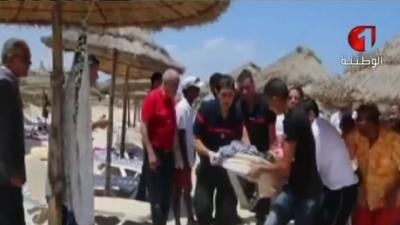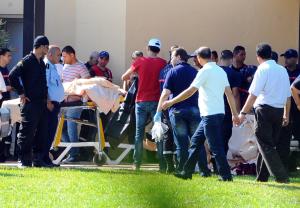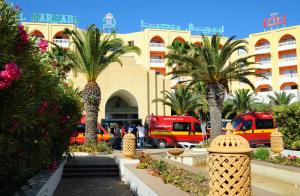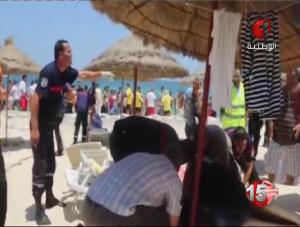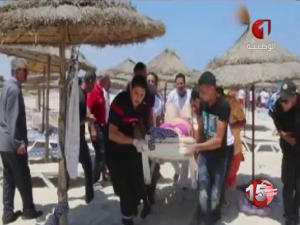Date: Fri, 26 Jun 2015 23:44:18 +0200
Dozens killed in attacks in Tunisia, Kuwait and France
In southeastern France, a man with ties to Islamic radicals rammed a car into a gas factory, touching off an explosion that injured two people. Authorities arriving at the site made a grisly discovery: the severed head of the driver's employer was found hanging at the plant entrance.
The suspect, Yassine Salhi, was seized by an alert firefighter, authorities said, and French President Francois Hollande said the attacker's intention had been to cause an explosion. A security alert for the southeast region was raised to its highest level for the next three days, and the U.S. Embassy in Paris warned American citizens to be vigilant.
In an audio recording released Tuesday, the Islamic State called on its supporters to increase attacks during Ramadan and "be keen on waging invasion in this eminent month and commit martyrdom."
In Britain, police said they were tightening security at major events after the attacks in France, Kuwait and Tunisia, including for the weekend events of Armed Forces Day and the Pride London gay and lesbian festival.
The attacks were condemned by the United Nations, the U.S., Israel and others.
"We stand with these nations as they respond to attacks on their soil today," the White House said. Pentagon spokesman Col. Steve Warren added it was "too soon to tell whether or not these various and far-flung attacks were coordinated centrally or whether they were coincidental."
The carnage in Tunisia began on the beach, where tourists described hearing what sounded like fireworks and then running for their lives when they realized it was gunfire. Video of the aftermath showed medics using beach chairs as stretchers to carry away people in swimsuits.
"He had a parasol in his hand. He went down to put it in the sand and then he took out his Kalashnikov and began shooting wildly," Chelli said of the gunman.
He then entered the pool area of the Imperial Marhaba hotel before moving inside, killing people as he went.
British tourist Gary Pine told AP he was on the beach with his wife around noon when heard the shooting. They shouted for their son to get out of the water, grabbed their bag and ran for the hotel. Their son told them he saw someone shot on the beach.
There was "sheer panic" at the hotel, Pine said. "There were a lot of concerned people, a few people in tears with panic and a few people — older guests — they'd turned their ankles or there was a few little minor injuries and nicks and scrapes."
Elizabeth O'Brien, an Irish tourist who was with her two sons, told Irish Radio she was on the beach when the shooting began.
"I thought, 'Oh my God. It sounds like gunfire,' so I just ran to the sea to my children and grabbed our things" before fleeing to their hotel room, she said.
The Health Ministry said the 37 dead included Tunisians, British, Germans and Belgians, without giving a breakdown.
British Foreign Secretary Philip Hammond says at least five Britons were killed but expected to toll to rise because a high proportion of the dead were believed to be British.
Since overthrowing its secular dictator in 2011, Tunisia has been plagued by terrorist attacks, although only recently have they targeted the tourism sector, which makes up nearly 15 percent of GDP.
"The Foreign Office will declare the summer effectively over for Tunisia, and it will destroy — besides the lives taken — the tens of thousands of livelihoods who depend on tourism for a living," said Simon Calder, a London-based travel commentator. Nearly half a million Britons visited Tunisia in 2014.
The attacks are also a blow to Tunisia's image as a stable, democratic nation emerging from its revolution in 2011, said Jonathan Hill, a professor of Defense Studies at King's College in London.
"The terrorists are attacking Tunisia's reputation," he said. "Not just as a safe and welcoming destination for Western holidaymakers, but as the one real success story to emerge out of the Arab Spring."
International police agency Interpol offered investigative help in the wake of Friday's violence. Interpol Secretary-General Juergen Stock said the attacks "show the truly global dimension to current terrorist threats."
___
Schemm reported from Rabat, Morocco. Associated Press Writers Bouazza Ben Bouazza in Tunis, Jill Lawless and Greg Katz in London, Shawn Pogatchnik in Dublin and Angela Charlton in Paris contributed to this report.
___
This story has been corrected to reflect that authorities now say there was only one gunman, not two, and that the message from the Islamic State was an audio recording, not a video.
